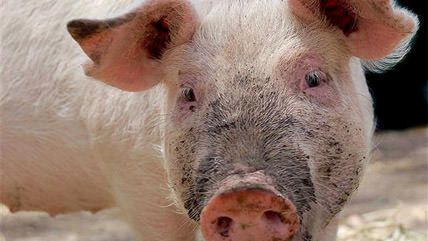All Animals Are Equal, But Politicians' Cronies Are More Equal Than Others
The privileged win. The people lose.

Politicians say, "We're all equal," and pretend that they represent everyone. But, in fact, they constantly pick winners and losers. America, as The Wall Street Journal's Kim Strassel points out, is now like the place described in George Orwell's book Animal Farm: "All animals are equal," but some are "more equal than others." Animal Farm was about Communism, but today the allegory applies to our bloated democracy, too.
During the "fiscal cliff" negotiations that Congress and the media made sound so tough—as if every last penny were pinched—Congress still managed to slip in plenty of special deals for cronies.
NASCAR got $70 million for new racetracks.
Algae growers got $60 million.
Hollywood film producers got a $430 million tax break.
When America's going broke, how do moviemakers get a special break? By lobbying for it. Movies are a sexy business, so 42 states offer film producers "incentives" to film there. (State legislatures are as shortsighted as Congress).
Michigan offered the juiciest handouts until the state ran out of taxpayers' money. Now Ohio, Louisiana and Georgia (that's why the latest "Hunger Games" movie was shot in Georgia) offer the biggest handouts. The mayor of Los Angeles recently declared a "state of emergency"—not over an earthquake or storm, but because so much moviemaking has left California for states with bigger subsidies.
The U.S., which used to pride itself on being more free-market than Europe, is now hardly different from France, which crippled its economy by subsidizing all sorts of old industries, and even gives money to producers of American films that mention France.
Politicians everywhere are always eager to help out people who helped get them elected. In the U.S., labor unions were big supporters of President Barack Obama, and—presto—unions got 451 waivers from Obamacare.
Congressional staff got a special exception, too. Funny how many of these laws are supposed to be great for all of us but, once passed, look ugly to the privileged class. So they exempt themselves.
Even the crusade to save the earth is captured by the "special" people. Subsidies for "green energy" were supposed to go to the best ideas. Yet somehow your money went to companies like Solyndra, whose biggest shareholder just happened to be an Obama backer who bundled money for the president.
And somehow Al Gore, who had a modest income when he entered politics, reaped $200 million from brilliant investments after he left office. He must just be really smart.
On my TV show this week, progressive commentator Ellis Henican says this cronyism is "inevitable" and doesn't really bother him: "If we want roads and bridges and prisons and a military and a safety net, someone somewhere is going to benefit from that. But you can't use that as an excuse to not do important things for our society."
I say it's one more reason to keep government small.
Politicians doling out favors quietly shift where society's resources flow, who gets employed, what ideas are pursued.
It distorts the economy and the culture—and it turns us into a nation of favor-seekers instead of creators and producers.
What about all the new businesses that would have gotten investment money but didn't have Gore on their boards? What new ideas might have thrived if old industries weren't coddled? We don't know. We will never know the greatness of what might have existed had the state not sucked the oxygen out of the incubator.
Because of government's favor-granting, Washington, D.C., is now the place where the well-connected go to get rich. For the first time in history, six of the richest counties in the U.S. surround D.C. When a small group of people gets to dispense $3.6 trillion and set rules that can help or kill your idea, you want to suck up to them.
As long as government has the power to grant favors, cronies and their lobbyists will seek those favors out.
The privileged win. The people lose.


Show Comments (68)